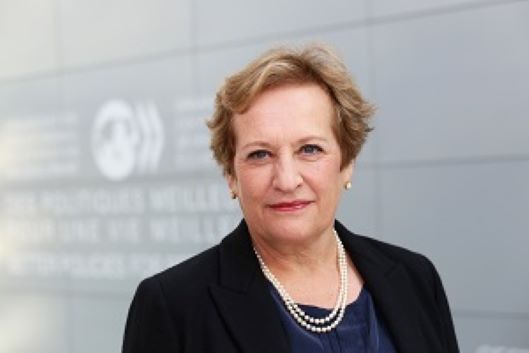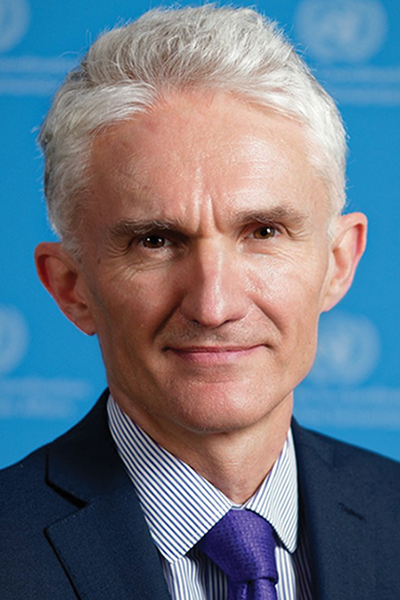Following the first virtual regular session in April, the 2020 Annual Session of the Executive Board will also take place virtually. Thanks to the many tools put in place by the WFP Executive Board Secretariat, which is working with HQ-Audio-Video colleagues to support virtual meetings since the beginning of the lockdown in Italy last March, the Membership will convene for a five-day session with a very dense agenda to discuss governance matters including the effectiveness of WFP's work during the COVID-19 pandemic. You can follow any item of your interest from the agenda.
Let’s take a look at some of the highlights and key documents of the upcoming session.
Introducing the session
Immediately upon gavelling the session open on Day 1, the President will ask the Board to approve a decision allowing the session to take place by virtual means, in respect of Rule I.4 of the Board’s Rules of Procedure. Before adopting the agenda, the President will ask all participants to observe a moment of silence for the victims of COVID-19 as well as for the loss on 6 May of Dr. Abdul Razak Ayazi, the late Agriculture Attaché of the Islamic Republic of Afghanistan who vastly contributed to relieve world hunger most recently as a representative on the WFP Executive Board and in the past as a former FAO director.
The virtual panel on Day 1 will include remarks from special guests and an interactive Q&A segment under the theme Working together to ensure coherent humanitarian development and peace efforts that meet and reduce the needs of the most vulnerable during the COVID-19. Among the speakers:
- H.E. Mr Janez Lenarcic, European Commissioner for Crisis Management, European Commission
_-_Crisis_management_(48833246092)_(cropped)1_0.jpg)
- Her Exellency Reem Ebrahim Al Hashimy, Minister of State for International Cooperation, United Arab Emirates.

- Ms Susanna Moorehead, Chair of the Development Assistance Committee of the Organisation for Economic Co-operation and Development (OECD-DAC).

- Mr Mark Lowcock, Under-Secretary-General for Humanitarian Affairs and Emergency Relief Coordinator, United Nations (UN) Office for the Coordination of Humanitarian Affairs (OCHA).

Key Documents
Annual Reports
Annual performance report for 2019
Illustrating how WFP continues to work at the humanitarian–development–peace nexus to break the cycle of hunger and poverty, this report provides a comprehensive record of WFP performance for 2019, with 97 million people assisted, representing the largest number since 2012, while operating in 88 countries. With Level 3 and Level 2 emergencies in 20 countries - resulting from long-standing operations, such as in the DRC, to the rapid scale-up of operations when Cyclone Idai hit Mozambique - WFP has effectively responded to the highest annual total ever. Efforts that were possible thanks to a record-breaking USD 8 billion in confirmed contributions, representing an upward trend of 66 percent compared to the past years - as contributions totalled only USD 4.8 billion in 2015, which witnessed WFP’s capacity to mobilize donors.
Among the milestones, in 2019 WFP became the first UN agency since 2011 to be given humanitarian access to Blue Nile State, in Sudan, following a decade of inaccessibility. In addition, 2019 was the year in which the final country strategic plans were approved by the Executive Board, with all WFP operations now governed by strategies that support national priorities for achieving zero hunger.
Read the full report here.
Policy issues and other business
Mid-term review of the WFP Strategic Plan (2017–2021)
The design of the first generation of CSPs was guided by a focus on SDG 2 and SDG 17. The review highlights WFP’s performance in support of SDG 2 to be in line with the organization’s expected role. In fact, it results in being the largest effort, with over two-thirds of planned requirements that went into ensuring access to food in emergency, the rest to “ending malnutrition” and activities focused on achieving food security through “smallholder productivity and incomes” and “sustainable food systems”. However, for WFP to go beyond service provision, much remains to be done on the SDG 17 front, particularly engaging on country capacity strengthening and the ability to capture the impact on people’s lives. In support of SDG 17, the recently approved private-sector partnerships and fundraising strategy (2020–2025) aims to transform how WFP works with businesses and other actors – particularly at the local level – to save and change more lives.
Read the full review here.
Update on WFP’s implementation of United Nations General Assembly resolution 72/279 (repositioning the United Nations development system)
With the aim of increasing value for money in the UN system through transformational change in management of back office functions (click here for more background information on UN business operations), the UN Business Innovations Strategic Results Group (BIG) has been leading to innovative changes in the way WFP works. For example, WFP’s humanitarian services marketplace has been activated at the global level as a response to the COVID-19 pandemic, offering cargo transport services for the COVID-19 response on a free-to-user basis through a digitized business management approach.
Outlining the UN development system (UNDS) reform in the context of COVID-19, this report highlights the major related-concerns and the importance of an UN-joint approach to tackle this challenge. There were an estimated 135 million acutely food-insecure people in the world before the outbreak of COVID-19, and WFP initial estimates suggest that there is a risk of a further 130 million becoming acutely food-insecure because of COVID-19 by the end of 2020.
Read the full information note here.
Comprehensive action plan (CAP) for the implementation of the recommendations of the joint Board/management working group on harassment, sexual harassment, abuse of power and discrimination (HSHAPD)
Throughout the past years, both WFP management and Member States have been reinforcing their commitment to prevent and address issues of abusive conduct within the organization. Based on metrics that have been used in the past in WFP's Global Personnel Survey (e.g. the global staff survey in 2018, which scored 85 percent in participation), the CAP was designed around the six key areas recommended by the joint working group on HSHAPD: reaffirmation of values, leadership role, employee involvement, policy and system audits, disciplinary processes and communications. The plan also contains an updated list of ongoing and planned WFP initiatives related to workplace culture.
Read the full plan here.
Resource, financial and budgetary matters
Under the agenda item 6, the richest of the session, will be discussed a series of reports and management responses aimed at ensuring the effectiveness of WFP’s internal control systems, risk management, audit and oversight functions and governance processes. To name a few: the Audited annual accounts, 2019; the Report of the FAO Finance Committee; the Annual Report of the Audit Committee; the Annual report of the Inspector General. Find the complete list of documents under Agenda item 6 here, which also includes a Note by the Executive Director on the annual report of the Inspector General, acknowledging the areas for improvement.
Replenishment of the special account for wellness programmes
Under the same Agenda item, it is worth mentioning the Replenishment of the special account for wellness programmes (SAWP). The global COVID-19 emergency, in addition to ongoing staff health and wellness programmes, has depleted the SAWP. With an initial USD 18 million allocation to start-up activities to support employee wellness under the WFP Wellness Strategy (2015–2019), the Executive Board is requested to approve the replenishment of the special account with an additional allocation of USD 8 million to allow the continued implementation of wellness programmes that address the health and safety risks facing WFP employees and their families through three central goals: (i) focus on the field; (ii) promote a corporate culture of health; (iii) create an enabling and supportive workplace.
Evaluation reports
Annual evaluation report for 2019
The Annual evaluation report for 2019, the fourth annual evaluation report produced under the WFP’s Evaluation Policy (2016–2021), gives an overview of centralized and decentralized evaluations completed, conducted and planned in 2019 and 2020, highlighting evidence in support of WFP’s strategic priorities.
Summary report on the evaluation of WFP's Gender Policy (2015–2020)
Submitted to the Board for consideration, the Summary report on the evaluation of WFP's Gender Policy (2015–2020) outlines the evidence of the modest progress made towards gender equality. However, the report makes clear that it has not yet been achieved at all levels or for all functions of the organisation, and that the broader challenges of gender mainstreaming have been overlooked. Aligned with the 2030 Agenda for Sustainable Development and the WFP Strategic Plan (2017–2021), the Gender Policy (2015–2020) remains relevant but requires an update to meet the demands of the evolving global context, by continuing reflecting the understanding that “context is everything”.
Organizational and procedural matters
As a living document, the Biennial Programme of Work of the Executive Board (2020–2021) will include the forthcoming comprehensive action plan on harassment, sexual harassment, abuse of power and discrimination and the update on WFP’s response to COVID-19 requested by Board members for the annual session, including WFP’s medium-and long-term planning scenarios and its contribution to the global humanitarian response plan (GHRP) for COVID-19 and the Secretary-General’s COVID response and recovery fund. As a result of the pandemic crisis, some policies may be delayed.
Read the document here.
